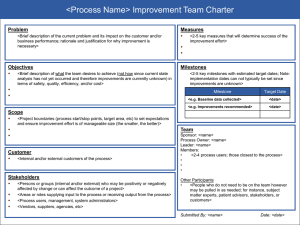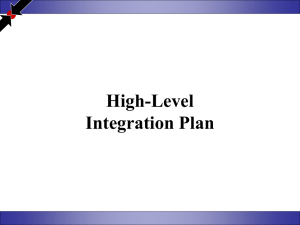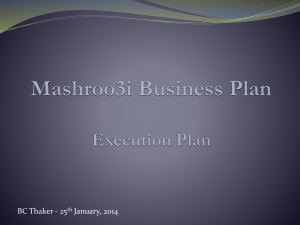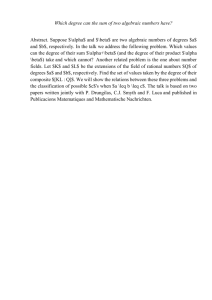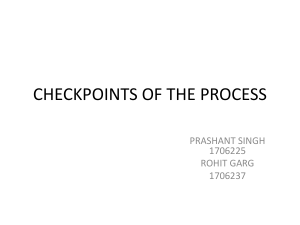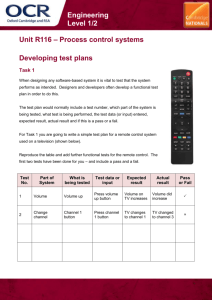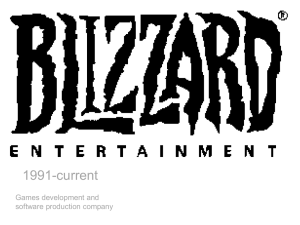Game Dev Process
advertisement
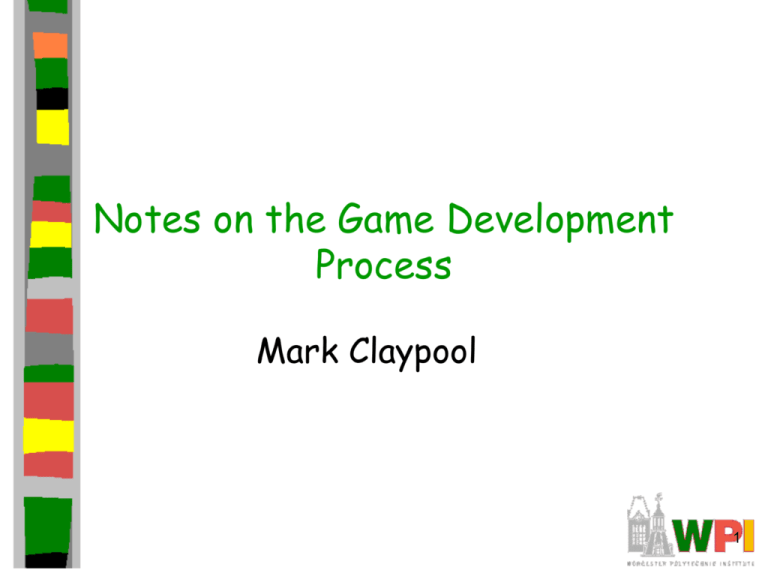
Notes on the Game Development Process Mark Claypool 1 Outline • Course description • Game Development Components • Stages of Game Development • Projects 2 Class Description ID 111x. THE GAME DEVELOPMENT PROCESS. This course discusses the process of game development. It examines the roles of different participants in the development process and how the technical development and the artistic development proceed in tandem. It also discusses the importance of testing and play testing, and how developers use the results of testing to improve their games. Students will be expected to develop games, or portions of games, using appropriate game development tools. Recommended background: none. • • • • • 3 Entry level course Artistic roles Technical roles Play testing Tools Game Development Components (1 of 2) • Production – Controls everything that is outside of actually making the game – i.e. budget, personnel, admin. – (Topic outside the focus of the course) – (Could be fodder for Management angle • ie- Entrepreneurship minor) 4 Game Development Components (2 of 2) • Design – How the game will look, what features it will include and how this will happen – Made up of the following three divisions: • Art: – Everything visual, 2D and 3D animation. • Programming: – The technical part of game development, the underlying coding that drives the software. • Sound: – Technical and creative 5 Outline • Course description • Game Development Components • Stages of Game Development • Projects 6 Stages of Game Development (1 of 8) • • The Idea Concept for a new game Clearly described – 3-10 pages – Outlining the game world, characters, challenges – Lose-or-win scenarios, basic mechanics • Becomes the pitch document – Gets the game accepted or rejected by the publisher (Time: weeks to months or even years) 7 Stages of Game Development (2 of 8) • • • The Pitch Idea presented to publisher (maybe manager, depending on game author) If idea captures interest, usually includes suggested revisions Idea is finally accepted (Time: weeks) 8 Stages of Game Development (3 of 8) • Proof of Concept Designer gets budget to build a prototype • Game design expanded to larger document • Budget proposed • • – Will be thrown away before game done – Focusing on details of gameplay (play mechanics) – Avoid focusing too much on user interface – Including time and money Game will be developed using the prototype and the design document as guidance Not guaranteed to go to development yet – That determined by success of this stage (Time to build prototype and design document: 2 to 3 months) 9 Stages of Game Development (4 of 8) • Start of Development Development team assembled • Process broken into milestones • How many milestones are there? – Uses design document that is 90% done – Milestones for measuring progress – Game is tested for gameplay and quality – Number depends on the size of the project • Typically fixed from the beginning – Need to avoid urge to add features (creep) during milestone cycles! (Time between milestones: about 2 months) 10 Stages of Game Development (5 of 8) • • • Milestone 1 Most critical milestone Game should have functional (not complete) art, sound and code Can assess feasibility and budget – Make changes, as appropriate • Then, rushes headlong into development! (Time to complete this milestone: 2-3 months) 11 Stages of Game Development (6 of 8) • • • • Alpha Lot of variation as to what is an Alpha Complete with Art, Sound and Code Not fully tested Some tuning, last minute additions and changes can still be done (Time to achieve Alpha from last milestone: 1 month) 12 Stages of Game Development (7 of 8) • • • • Beta Finished game, all features tested and tuned External testing to check compatibility issues Users play free of charge in exchange for reporting bugs (Hopefully) no changes to any art, sound or code – Only bug fixes 13 (Time to Beta from Alpha: 2 weeks) Stages of Game Development (8 of 8) • • Gold Master Accepted as complete Includes known bugs (Time to Gold from Beta: one to two weeks.) • • Distribution Game is mass produced Put into boxes, shrink-wrapped and shipped to retailers (Time to shelves from Gold: 1 to 2 months) 14 Game Development Stages (Summary) • The Idea • The Pitch • Proof of Concept • Start of Development – Milestone 1 • Alpha • Beta • Gold 15 Outline • Course description • Game Development Components • Stages of Game Development • Projects 16 Project Topics 1) The Pitch 2) Technical – Add/Modify simple scripting 3) Artistic – Create/Modify content 4) Game Design – Putting it all together 5) Testing • Build to “Game Design”, use one tool – Warcraft III map editor 17 Warcraft III Overview 18 Warcraft III World Editor • Add art • Add/modify own sounds • Add events – Triggers and trigger editor • Create mods – Easter bunny hunt – World of Warcraft Soccer 19 Warcraft III World Editor 20 World Cup of Warcraft (1 of 2) 21 World Cup of Warcraft (2 of 2) 22 LOTR: The Ring Wars 23 Funny Bunny’s Egg Hunt 24
